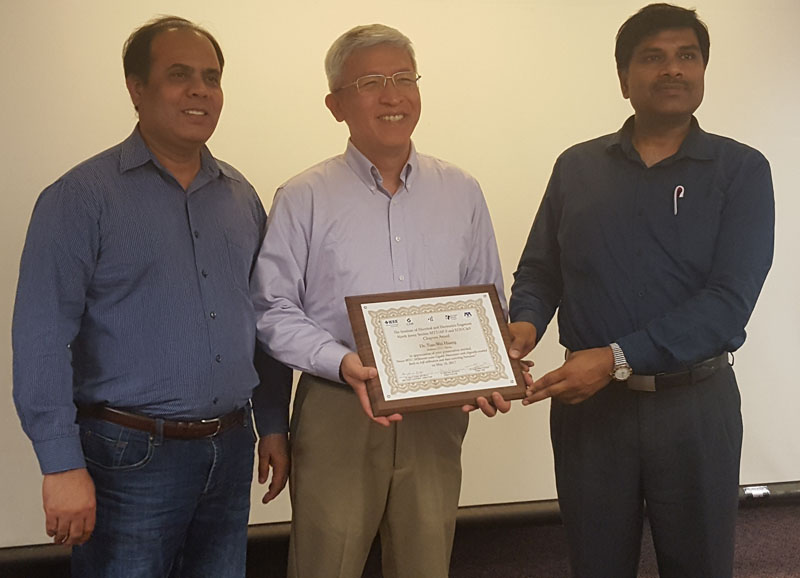Smart RFIC: Millimeter-wave Gigabit Transceivers with Digitally-enabled Built-in Self-calibration and Auto-switching Functions Co-sponsored by MTT/AP, ED/CAS & TMC
MTT/AP and ED/CAS

n our daily life, we have smart phones, smart TVs, or even auto-pilot smart cars in the future. In our engineer careers, we have smart antenna, smart baseband chips, but we still need auto-calibration smart RFICs. Especially for millimeter-wave RFICs with giga-hertz bandwidth, the narrow-band baseband calibration cannot compensate the broadband AM/AM or AM/PM non-ideal properties.
For future multi-band multi-standard radio, auto-band-switching is an essential function to optimize RF performance and to simplify the system control interface. A Miller-divider-type frequency sensor can be used to detect the frequency of input signal and perform auto-band-switching inside RFIC without any system control bits. For parametric sensitive 3rd-order nonlinearity, we need parametric-insensitive calibration methods to compensate the non-ideal behavior within RFIC. For millimeter-wave phase array system, the phase error comes from not only phase shifters but also other functional blocks, like variable gain amplifier (VGA), during phase shifting and gain compensation. We need a phase-error calibration method to compensate the phase error from all RFIC blocks.
To optimize system EVM performance, IQ modulator/demodulator are the key components to compensate IQ mismatch at RF frequency, which is also the enabling technology for gigabit high-QAM wireless links. The load-insensitive indicator is used to evaluate different IQ topologies. For IQ self-calibration at RF frequency, the phase compensation has more design challenges than the amplitude calibration, so composite right/left-handed transmission line, switching capacitor array, and phase shifters have been proposed in the IQ phase calibration. All above built-in self-calibration and auto-switching functions are innovated to pave the road to the next-generation millimeter-wave 5G mobile smart RFIC.
Date and Time
Location
Hosts
Registration
-
 Add Event to Calendar
Add Event to Calendar
- 154 Summit Street, Newark, NJ 07102
- NJIT
- Newark, New Jersey
- United States 07102
- Building: ECEC
- Room Number: 202
- Click here for Map
- Contact Event Host
-
Dr. Ajay K. Poddar, Ph.: 201-560-3806, email:akpoddar@ieee.org
Dr. Durga Misra, +1-973-596-5739, email: dmisra@ieee.org
Dr. Edip Niver, email: edip.niver@njit.edu
- Co-sponsored by AP01/MTT17 & ED/CAS
Speakers
 Dr. TIAN-WEI HUANG of National Taiwan University, , Tiawan
Dr. TIAN-WEI HUANG of National Taiwan University, , Tiawan
Smart RFIC: Millimeter-wave Gigabit Transceivers with Digitally-enabled Built-in Self-calibration and Auto-switching Fun
Email:
Address:National Taiwan University, , Tiawan, Taiwan
Dr. TIAN-WEI HUANG of National Taiwan University, , Tiawan
Smart RFIC: Millimeter-wave Gigabit Transceivers with Digitally-enabled Built-in Self-calibration and Auto-switching Fun
Biography:
Email:
Address:Tiawan, Taiwan
Dr. TIAN-WEI HUANG of National Taiwan University, , Tiawan
Smart RFIC: Millimeter-wave Gigabit Transceivers with Digitally-enabled Built-in Self-calibration and Auto-switching Fun
Biography:
Email:
Address:Tiawan, Taiwan
Dr. TIAN-WEI HUANG of National Taiwan University, , Tiawan
Smart RFIC: Millimeter-wave Gigabit Transceivers with Digitally-enabled Built-in Self-calibration and Auto-switching Fun
Biography:
Email:
Address:Tiawan, Taiwan
Agenda
Event Time:6:00 AM to 8:00 PM
6:00:00 PM - Refreshments and Networking
6:30PM-7:30 PM: Talk by Dr. TIAN-WEI HUANG,National Taiwan University, , Tiawan
Seminar in ECE 202 All Welcome: There is no fee/charge for attending IEEE technical semiar. You don't have to be an IEEE Member to attend. Refreshment is free for all attendess. Please invite your friends and colleagues to take advantages of this Invited Distinguished Lecture.
This MTT-S DML Talk is co-sponsored by MTT/AP, ED/CAS, and TMC society

